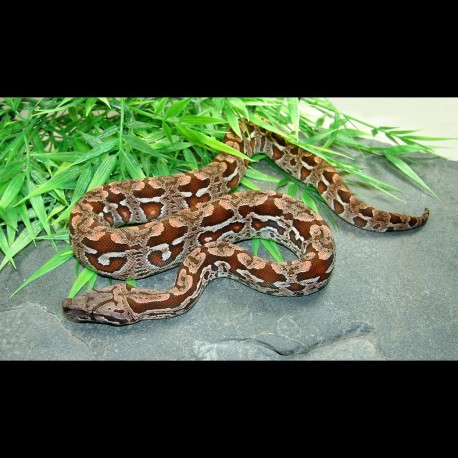No Products
 View larger
View larger Dumeril's Boas (Babies)
Dumeril's Boas (Boa dumerili)
This product is currently out of stock
More Info
Dumeril's Boas (Boa dumerili)- A non-venomous boa species found on Reunion Island and Madagascar along the western coast and southwestern regions, found in a semi-arid habitat that gets fairly low amounts of rainfall. Adults usually grow to 6.5 feet (2 m) in length with the maximum reported to be 8 foot, 6 inches (259 cm). Males usually have longer flatter tails, while females tend to be larger overall. The color pattern consists of a gray-brown ground color with darker patches, forming an effective camouflage against the leaf litter of the forest floor of their native habitat.
Feeding
Their diet consists of small animals, such as birds, lizards, and small mammals. They are also known to prey on other snakes.
Reproduction
Sexual maturity is within 3 to 5 years of age. Males have anal spurs, which are used in courtship. Their mating season is March through May and the young are born some 6 to 8 months later. Ovoviviparous, females give birth to a litters of 6-28. Neonates are 12-18 inches (30-46 cm) long.
Captivity
Once exported from Madagascar in great numbers, trade in this species has since been heavily restricted. They are, however, quite prolific in captivity, and animals are relatively inexpensive and easy to find in the exotic pet trade. Though their size makes them more suited to someone experienced with large constrictors, they have a typically docile nature, and readily feed on rats. The main concern is that they are prone to stress, which can sometimes cause them to stop eating or contribute to other health issues.
Reproduction
Sexual maturity is within 3 to 5 years of age. Males have anal spurs, which are used in courtship. Their mating season is March through May and the young are born some 6 to 8 months later. Ovoviviparous, females give birth to a litters of 6-28. Neonates are 12-18 inches (30-46 cm) long.
Captivity
Once exported from Madagascar in great numbers, trade in this species has since been heavily restricted. They are, however, quite prolific in captivity, and captive bred animals are relatively inexpensive and easy to find in the exotic pet trade. Though their size makes them more suited to someone experienced with large constrictors, they have a typically docile nature, and readily feed on rats. The main concern is that they are prone to stress, which can sometimes cause them to stop eating or contribute to other health issues.

